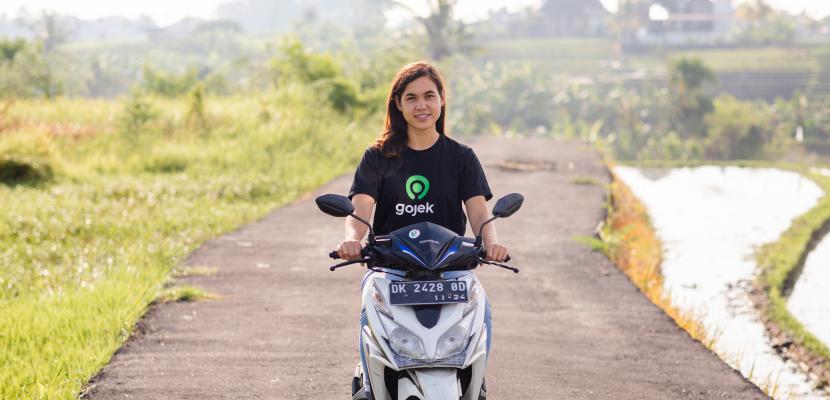
by Andrew Bryan
Ms Tanah Sullivan’s (Class of 2005) commute through the bustling streets of Jakarta is a daily reminder of the lofty goals she has set herself at Indonesia’s largest technology group. Picking her up for her daily trips will be one of two million drivers for Gojek, a company that comprises one half of the GoTo Group where Ms Sullivan is Head of Sustainability.
Jakarta, a sprawling metropolis home to more than 10 million residents, is the world’s fastest-sinking city. Scientists believe 95 per cent of it will be underwater by 2050, and that looming deadline helped drive Gojek’s first ever annual sustainability report in which the company committed to zero emissions, zero waste, and zero socioeconomic barriers by 2030.
Even with full buy-in from leadership, the challenge for Ms Sullivan is shifting the company’s immediate short-term cyclical focus to a long-term strategy. The stakes for the Indonesian capital and its inhabitants – including the Gojek drivers – are high.
“Jakarta is sinking pretty fast,” Ms Sullivan says. “So why wouldn’t we be preparing as best as possible our ecosystem, which consists of millions of drivers, users and merchants, because they’re going to be the most impacted.
"By 2050, if 96 per cent of the northern city is underwater – and science says it will be – for sure there’s going to be a disruption to our business model and to the livelihoods of the people in our ecosystem. My job is really to build the resilience of the company, platform and ecosystem to those types of risks, which have historically fallen through the cracks because they’re not imminent financial risks. But if I don’t do my job well, they will become financial risks.
"The bottom line for us is we want to be part of the solutions to these big, global challenges, and the investment now is going to be worth it because it reduces our exposure to these potential risks in the future. We’re in big trouble if we can’t demonstrate how we’re responding to the environmental, social and economic challenges across our ecosystem, because our ecosystem will suffer and our stakeholders alongside it.”
GoTo Group comprises Indonesia’s two most valuable startups – Gojek and Tokopedia. Gojek is an Indonesian on-demand multi-service platform and digital payment technology group with more than 170 million users across southeast Asia. Tokopedia is a technology company specialising in e-commerce, with more than 100 million active users and 11 million merchants.
Among the services offered by Gojek are mobility and logistics services with more than two million drivers, and it’s a service Ms Sullivan is well acquainted with.
“I still take a Gojek every day, and a lot of the time they’re facing really challenging times, especially because of the pandemic,” she says. “If they don’t get orders, there’s an impact on their livelihoods which can be tough where they have families to support.
"If there’s flooding in the city, which can happen often, that disrupts their ability to get around. Increasingly extreme weather and temperatures affects them disproportionately. I feel those things very, very personally, I always have. I spend most of my day advocating for better policies, tools and programs that the company can roll out in the service of the people who keep our engine running, literally and figuratively.
"Without these drivers, without these merchants, we’re nothing.”
Ms Sullivan hopes the GoTo Group’s sustainability efforts will not only shape the future direction of the company, but also help solve some of the challenges Indonesia faces. To achieve this requires sometimes difficult conversations and a lot of alignment with Ms Sullivan’s colleagues, articulating the need to implement change across the organisation.
“Sustainability only works as well as everyone’s bought into it,” she says. “This is what sustainability is, it’s looking at the whole picture and the whole ecosystem. We are redesigning what a company means in this day and age, and for the future. We are not just beholden to investors but also to a broader set of stakeholders across our ecosystem, who don’t just care about our financial metrics.
"We’ve also got to be sure we’re transparent to this and the next generation of consumers who are going to be financially driving our platform and our business.”
Ms Sullivan had a unique career path spanning six countries since graduating from Bond with a Bachelor of International Relations. Her career started in foreign policy and nuclear security for the Canadian government in Japan and she has since worked on issues spanning trade and investment, food security, gender parity, deforestation and energy transition – most recently at the World Economic Forum in Geneva. The one constant has been her insatiable determination to make a difference.
“I think the recurring theme in my career and life is a good global citizen,” she says. “I always wanted to diversify as best as possible and get different international experiences and exposure to different cultures, in order to best understand the perspectives of others who may not be able to advocate for themselves... because I was brought up that way by my parents.”
The mother of two children – born in Canada and Switzerland – has more than a vested interest in her role.
“I would do anything for my kids,” she says. “I think it’s not just my kids, but also everyone else’s kids. I look at mine and I think, by the time they’re in their 30s, a lot of the city we’re living in is going to be underwater, that’s pretty crazy. What world are our kids inheriting?
"At least in my instance, I can look at my kids and say, ‘You know what, Mum did the best that she could’. It might not move the needle for the entire world but, for this community, it will make a difference.”